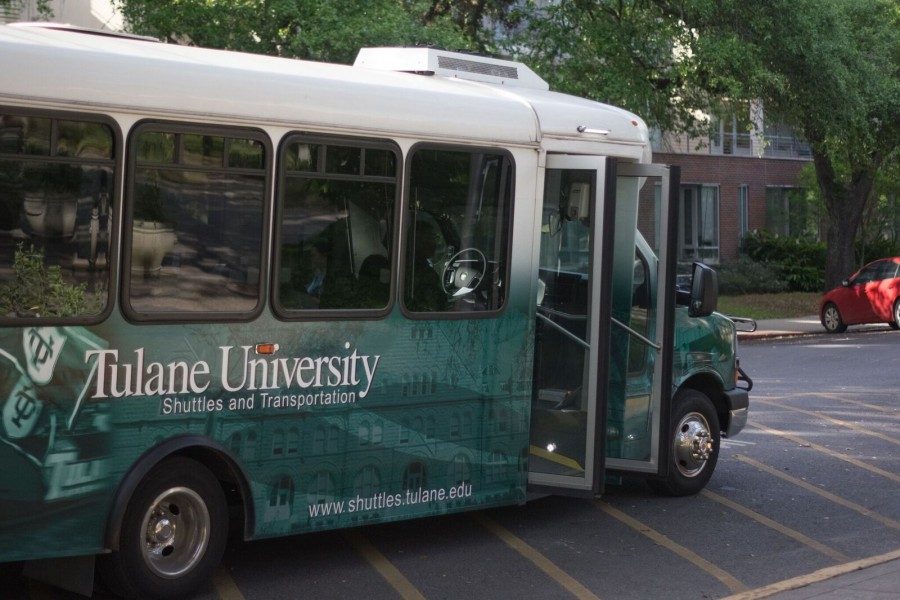Tulane reinstates shuttle service for contracted workers
The Tulane shuttle system is available to students, staff and faculty.
For 17 months, affiliated employees, including the contracted workers of Sodexo and DTZ, were unable to use Tulane shuttle services available to students, faculty and staff. Tulane and its affiliate organizations reinstated the service in February, hoping to resolve the concerns of students and student organizations.
The shuttle service was previously available to contracted workers, but in October 2015, Tulane discontinued the service after its insurance policy stopped covering affiliate employees.
Students have demanded the service be reinstated. The Call for Unity in November 2015 and the protest for the Office of Multicultural Affairs’ expansion in November 2016 both mentioned the lack of transportation services available for contracted workers.
“We are concerned that Tulane University actively discriminates against service workers on its campus by denying them the benefits other staff and faculty are given,” the Tulane Black Student Union’s Call for Unity List of Demands read. “Tulane should demonstrate its commitment to race and class diversity by … allowing DTZ and Sodexo workers to ride the University shuttles to and from work.”
Students Organizing Against Racism co-convener Maddy Lowry said the shuttle service was included on the List of Demands because it was a tangible change for the university to make.
“However, it represents only a small step in the work that needs to be done for workers’ rights on this campus,” Lowry said.
After the Call for Unity, President Michael Fitts created the Presidential Commission on Race and Tulane Values, which sought to address various issues including the use of Tulane shuttles by contracted employees. The commission’s website stated Tulane had “been unable thus far to solve insurance issues.”
Other issues cited on the website include the expense to Tulane for insuring affiliates and the possibility of being held legally responsible for incidents outside the boundaries of the insurance policy.
Fitts said he is pleased that Tulane is now able to offer shuttle service to all of its affiliate employees and that the suspension of the service was always meant to be temporary.
Through collaborations with Sodexo, DTZ and affiliate organizations, the university developed the Tulane Shuttle Affiliate Ridership Program. This program created a process in which contracted workers can obtain a ridership pass by completing a form in the Splash Card Office.
The pass is a sticker placed at the bottom of the affiliate’s Splash Card, which the worker presents when entering the shuttle. All riders must show valid Tulane identification or Loyola Express Card, but the ridership pass only applies to affiliated workers.
The program limits the lines available to affiliate employees. The contracted employees cannot access the Elmwood or Metairie Entertainment lines or the Gold Zone shuttle.
Dining and Auxiliary Services Director Lisa Norris said she sees the reinstatement of the service as proof of efforts to provide workers with equal treatment.
“Together, Tulane and Sodexo work to ensure that all Sodexo affiliate employees are given the same level of support and respect afforded to Tulane employees,” Norris said in a Letter to the Editor, citing the reinstated shuttle service as an example.
Freshman Jenny Ly said she feels Tulane uses the city’s culture as a selling point to prospective students but that Tulane’s treatment of contracted workers is problematic.
“… [The university’s] treatment of its affiliated employees, who are predominantly locals, does not reflect its mission to incorporate New Orleans culture into campus life,” Ly said. “As a native of New Orleans, it’s easy to identify that the only true New Orleans aspect of Tulane is its affiliated employees …”
Leave a Comment
Your donation will support the student journalists of Tulane University. Your contribution will allow us to purchase equipment and cover our annual website hosting costs.
















Edward Smith • Apr 10, 2017 at 6:45 pm
Binfer has another great affiliate program. Details here: See http://www.binfer.com/affiliates.